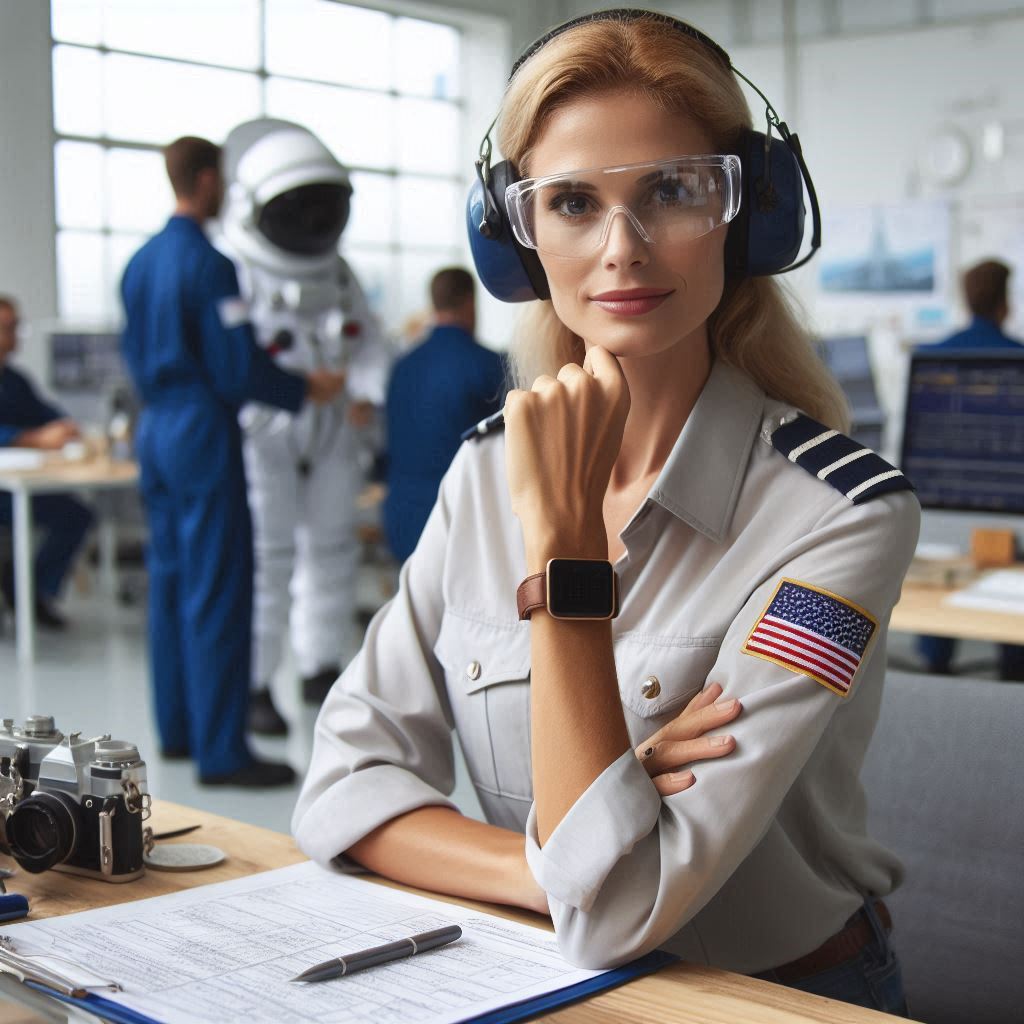Introduction
The aerospace engineering industry is dynamic and innovative, driving advancements in aviation and space exploration.
Working for a top aerospace engineering company provides unique opportunities to contribute to groundbreaking projects and be at the forefront of technological developments.
These companies offer access to cutting-edge technology, fostering professional growth and development.
They also emphasize a collaborative work environment, encouraging creativity and innovation.
Top aerospace engineering companies invest heavily in research and development, constantly pushing the boundaries of what is possible.
Employees at these companies work on projects that can change the future of transportation and exploration.
They also receive the benefit of working alongside some of the brightest minds in the industry, providing an invaluable learning experience.
Choosing the right company can significantly impact your career trajectory.
It can open doors to exciting projects and provide a platform for you to showcase your skills.
The right company will also offer a supportive environment that nurtures your professional and personal growth.
Working for a top aerospace engineering company can lead to numerous career advancement opportunities, from promotions to leadership roles.
Overview of the aerospace engineering industry
Aerospace engineering is a dynamic and rapidly growing industry that plays a crucial role in shaping the future of aviation and space exploration.
With advancements in technology and increasing demand for air travel, the aerospace engineering field offers numerous opportunities for professionals to build exciting careers.
Aerospace engineering is not just limited to designing and building aircraft and spacecraft.
It also extends to research and development in areas such as propulsion systems, aerodynamics, avionics, materials science, and more.
Aerospace engineers are at the forefront of innovation, driving advancements in technology that have far-reaching impacts on various industries.
Growth and opportunities in the field
The aerospace engineering industry is expected to continue its growth trajectory in the coming years.
With the rise of commercial space travel, the demand for aerospace engineers with expertise in spacecraft design and propulsion systems is on the rise.
Additionally, advancements in drone technology and unmanned aerial vehicles are opening up new opportunities for aerospace engineers to work on cutting-edge projects.
As companies like SpaceX and Blue Origin push the boundaries of space exploration, the need for skilled aerospace engineers will only increase.
Aerospace engineering offers a diverse range of career paths, from working on aircraft design for commercial airlines to developing satellites for communication and remote sensing applications.
Importance of aerospace engineering in various industries
Aerospace engineering plays a critical role in a wide range of industries beyond aviation and space exploration.
The expertise of aerospace engineers is essential in developing defense technologies, such as missile systems and military aircraft.
Aerospace engineering principles are also applied in the automotive industry to improve fuel efficiency and aerodynamics in vehicles.
In the renewable energy sector, aerospace engineers contribute to the design and optimization of wind turbines and solar panels.
Their skills in materials science and structural engineering are invaluable in developing sustainable energy solutions.
Aerospace engineers are also involved in the design of infrastructure such as bridges and buildings, where their knowledge of aerodynamics and structural mechanics is put to good use.
Role of aerospace engineers in innovation and technology advancement
Aerospace engineers are at the forefront of innovation, constantly pushing the boundaries of what is possible in aviation and space exploration.
They are responsible for developing technologies that improve the safety, efficiency, and sustainability of air travel.
From designing more fuel-efficient engines to creating advanced navigation systems, aerospace engineers play a crucial role in shaping the future of transportation.
Advancements in aerospace engineering have led to the development of cutting-edge technologies such as supersonic flight, reusable spacecraft, and autonomous drones.
Aerospace engineers are also driving innovation in materials science, developing lightweight and durable materials that can withstand extreme conditions in space.
Their work is essential for the success of ambitious projects such as Mars exploration missions and commercial space tourism.
Basically, the aerospace engineering industry offers exciting opportunities for professionals looking to make a difference in the world of aviation and space exploration.
With its diverse range of applications and constant demand for innovation, aerospace engineering is a field that promises endless possibilities for those willing to push the boundaries of technology and engineering.
Criteria for Determining Top Aerospace Engineering Companies
Reputation and Global Recognition
Top aerospace companies boast strong reputations and global recognition.
Boeing, founded in 1916, is known worldwide for its innovative aircraft.
Lockheed Martin, established in 1995, has earned a reputation for cutting-edge defense and aerospace technology.
Airbus, a European leader founded in 1970, is recognized for its efficient and eco-friendly planes.
Northrop Grumman, founded in 1939, is renowned for its stealth technology and defense systems.
These companies are industry leaders, setting high standards for quality, safety, and innovation.
Employee Satisfaction and Benefits
Employee satisfaction is a priority for these top aerospace companies.
Boeing offers comprehensive health insurance, retirement plans, and paid time off.
Their wellness programs support mental health and fitness.
Lockheed Martin provides competitive salaries, health benefits, and flexible work schedules.
They also offer extensive wellness programs focusing on physical and mental health.
Airbus ensures attractive benefits packages, including health insurance, retirement plans, and paid leave.
Their wellness programs promote work-life balance and provide fitness and health resources.
Northrop Grumman offers comprehensive health coverage, retirement benefits, and paid time off.
Their wellness programs include health screenings, fitness challenges, and mental health support.
These benefits and programs enhance employee satisfaction and productivity.
Research and Development Advancements
Leading aerospace companies drive research and development advancements.
Boeing invests heavily in R&D to develop new technologies and improve existing ones.
They focus on sustainability, fuel efficiency, and advanced aerodynamics.
Lockheed Martin leads in developing cutting-edge defense systems and aerospace technologies.
Their R&D efforts include autonomous systems, cyber security, and advanced materials.
Airbus prioritizes research in eco-efficiency and new materials to reduce environmental impact.
They also work on innovative cabin designs and enhanced passenger comfort.
Northrop Grumman invests in advanced defense technologies, including unmanned systems, cyber security, and space exploration.
Their R&D efforts ensure they remain at the forefront of technological advancements.
Salary and Career Growth Opportunities
Top aerospace companies offer competitive salaries and career growth opportunities.
Boeing provides attractive compensation packages and supports employee development through training programs.
They offer leadership development and educational assistance.
Lockheed Martin offers competitive salaries and numerous training programs.
They provide mentorship opportunities and career development resources.
Airbus ensures competitive compensation and extensive training programs.
They offer career development plans and opportunities for international assignments.
Northrop Grumman provides competitive salaries and comprehensive career development programs.
They offer mentorship and continuing education opportunities.
These companies understand that investing in their employees’ growth is crucial for innovation and success.
By fostering a culture of continuous learning and professional development, these companies attract and retain top talent.
Aspiring aerospace engineers should consider these companies for their commitment to employee growth and industry-leading projects.
Working with these industry leaders can significantly enhance your career trajectory and provide unparalleled opportunities for advancement.
Choosing the right company is a crucial step in building a successful aerospace engineering career.
These top aerospace companies offer exceptional opportunities for growth, innovation, and professional satisfaction.
Read: Economic Indicators and Their Influence on US Architects
Boeing
History and Background of the Company
Aerospace engineering companies have a rich history of innovation and excellence.
Boeing, founded in 1916, started as a small aircraft manufacturing company.
It quickly grew into a global leader in aerospace and defense.
Similarly, Lockheed Martin, established in 1995 through a merger, has roots dating back to 1912.
These companies have played pivotal roles in advancing aerospace technology.
Northrop Grumman, another giant, began in 1939 as Northrop Aircraft Incorporated.
Over the decades, it has become a key player in defense and aerospace.
Airbus, founded in 1970, emerged as a major competitor to Boeing.
It unified European aerospace efforts, creating a powerful multinational corporation.
These companies have continually pushed the boundaries of what is possible in aerospace engineering.
Notable Projects and Achievements
Boeing is renowned for its commercial aircraft, such as the 747 and the 787 Dreamliner.
It has also been instrumental in space exploration, contributing to the International Space Station.
Lockheed Martin’s F-35 Lightning II is a state-of-the-art fighter jet used by many nations.
The company also played a crucial role in the Mars rover missions.
Transform Your Career Today
Unlock a personalized career strategy that drives real results. Get tailored advice and a roadmap designed just for you.
Start NowNorthrop Grumman developed the B-2 Spirit stealth bomber and the James Webb Space Telescope.
Both are significant technological marvels.
Airbus is known for its A380, the world’s largest passenger airliner.
The company also advances sustainable aviation with projects like the E-Fan X, a hybrid-electric aircraft.
Employee Perks and Benefits
Working at these aerospace giants offers numerous perks and benefits.
Boeing provides competitive salaries, comprehensive health benefits, and retirement plans.
Employees enjoy opportunities for career advancement and continuous learning.
The company also offers flexible work schedules and generous paid time off.
Lockheed Martin emphasizes work-life balance with flexible hours and telecommuting options.
It provides robust health and wellness programs, including mental health support.
Employees benefit from tuition reimbursement and extensive professional development programs.
The company also offers employee discounts and community service opportunities.
Northrop Grumman offers similar benefits, focusing on employee well-being and career growth.
It provides health, dental, and vision insurance, along with retirement savings plans.
Employees enjoy access to fitness centers, wellness programs, and flexible working arrangements.
The company also supports continuing education and professional certification.
Airbus offers competitive compensation packages, including performance bonuses and stock options.
Employees benefit from comprehensive health insurance and retirement plans.
The company promotes a healthy work-life balance with flexible hours and remote work options.
Airbus also invests in employee development through training programs and international assignments.
Employee Reviews and Satisfaction Ratings
Employee reviews highlight the positive work environments at these companies.
Boeing employees appreciate the collaborative culture and opportunities for innovation.
They value the company’s commitment to diversity and inclusion.
Employee satisfaction ratings are generally high, reflecting a supportive workplace.
Lockheed Martin employees praise the company’s focus on cutting-edge technology and career development.
They appreciate the work-life balance and supportive management.
High satisfaction ratings indicate a strong sense of employee engagement and loyalty.
Northrop Grumman receives positive feedback for its challenging projects and supportive culture.
Employees value the emphasis on professional growth and work-life balance.
Satisfaction ratings are consistently high, reflecting a positive work environment.
Airbus employees highlight the company’s commitment to sustainability and innovation.
They appreciate the global opportunities and supportive culture. High satisfaction ratings underscore a positive and rewarding workplace.
Therefore, top aerospace engineering companies offer rich histories, notable achievements, and excellent employee benefits.
Positive employee reviews and high satisfaction ratings make these companies desirable workplaces.
For those passionate about aerospace engineering, these companies provide outstanding career opportunities.
Read: Post-Pandemic Design Trends: US Architects Adapt
Lockheed Martin
Overview of the Company’s Aerospace Engineering Division
Aerospace engineering companies lead innovation and technological advancements.
Their aerospace divisions are the heart of these breakthroughs.
Boeing, for instance, drives cutting-edge developments in commercial and defense sectors.
The division focuses on designing, testing, and manufacturing aircraft and space vehicles.
Engineers at Boeing work on advanced systems and materials, pushing the boundaries of flight and space exploration.
Airbus is another powerhouse in aerospace engineering.
Their division excels in creating commercial aircraft with superior performance and efficiency.
They prioritize sustainability, developing eco-friendly aircraft.
Engineers at Airbus tackle challenges in aerodynamics, propulsion, and avionics.
Lockheed Martin’s aerospace division emphasizes defense and security.
Their projects include advanced fighter jets and space exploration missions.
Engineers here engage in high-stakes innovation, contributing to national and global security.
Major Projects and Collaborations
Major projects define these companies’ contributions to aerospace engineering.
Boeing’s recent achievements include the development of the 777X aircraft.
This project emphasizes fuel efficiency and passenger comfort.
Boeing collaborates with global suppliers to enhance technological integration.
Airbus’s A350 XWB project showcases their commitment to innovation.
This aircraft offers improved fuel efficiency and lower emissions.
Airbus collaborates with international partners to integrate advanced materials and systems.
Lockheed Martin’s F-35 Lightning II project stands out in the defense sector.
This advanced fighter jet incorporates stealth technology and superior avionics.
Collaboration with international defense partners ensures cutting-edge capabilities and global reach.
SpaceX, another leader in aerospace engineering, revolutionizes space travel.
Their Starship project aims for Mars exploration and commercial space travel.
SpaceX collaborates with NASA and other agencies to advance space technology.
Employee Development Programs and Training Opportunities
These companies invest heavily in employee development.
Boeing offers extensive training programs for engineers.
Their Learning Together Program supports employees’ education and skill enhancement.
Mentorship opportunities foster growth and knowledge sharing.
Showcase Your Business Today
Reach thousands of readers actively exploring professional services. Publish your business profile and grow your audience now.
Publish NowAirbus provides continuous learning through their Airbus Leadership University.
Employees access courses on technical skills and leadership.
Airbus encourages career development through rotational programs and international assignments.
Lockheed Martin emphasizes lifelong learning.
Their Center for Leadership Excellence offers various training modules.
Employees gain skills in engineering, leadership, and project management.
Lockheed Martin supports further education through tuition reimbursement programs.
SpaceX focuses on hands-on training.
Engineers receive practical experience on innovative projects.
SpaceX fosters a learning culture, encouraging creativity and problem-solving.
Company Culture and Work-Life Balance
Company culture significantly impacts employee satisfaction.
Boeing promotes a collaborative and inclusive environment.
Their Employee Assistance Program supports work-life balance.
Flexible work arrangements help employees manage personal and professional commitments.
Airbus values diversity and inclusion.
They foster a supportive and respectful workplace.
Airbus’s Wellbeing Program offers resources for mental and physical health.
Employees enjoy flexible working hours and remote work options.
Lockheed Martin emphasizes teamwork and innovation.
Their culture encourages employees to push boundaries and think creatively.
Lockheed Martin supports work-life balance through flexible schedules and comprehensive wellness programs.
SpaceX’s culture is dynamic and fast-paced.
They prioritize innovation and problem-solving.
Despite the demanding environment, SpaceX offers flexible work hours.
They emphasize the importance of employee well-being and work-life balance.
These top aerospace engineering companies offer rewarding careers.
Their innovative projects, employee development programs, and supportive cultures make them ideal workplaces.
Aspiring aerospace engineers can thrive in these environments, contributing to groundbreaking advancements in aerospace technology.
Industry partners, and grow their careers in a supportive and inclusive environment.
Read: How to Become a Civil Rights Advocate

SpaceX
Introduction to the Private Aerospace Company
Private aerospace companies are leading the charge in space exploration and innovation.
These companies focus on developing advanced technologies to revolutionize the aerospace industry.
Their contributions are critical in pushing the boundaries of space travel and aviation.
Private aerospace companies often work on cutting-edge projects, making significant impacts on the future of transportation and exploration.
Revolutionary Projects and Space Missions
One of the hallmarks of top private aerospace companies is their involvement in revolutionary projects and space missions.
These companies undertake ambitious endeavors, such as launching satellites, conducting space tourism, and exploring other planets.
For instance, SpaceX’s mission to Mars aims to make human life multi-planetary.
Their reusable rockets, like the Falcon 9, have redefined space travel’s cost and efficiency.
Blue Origin, another industry leader, focuses on enabling private human access to space with its New Shepard and New Glenn rockets.
These projects showcase their commitment to innovation and progress.
Private aerospace companies also collaborate with government agencies like NASA to achieve significant milestones.
For example, SpaceX’s Crew Dragon missions transport astronauts to the International Space Station.
This collaboration demonstrates the trust and reliability these private companies have earned.
Such projects highlight the critical role private aerospace companies play in advancing space exploration.
Company Culture and Innovation
Company culture and innovation are pivotal in attracting top talent to private aerospace companies.
These companies foster an environment that encourages creativity and out-of-the-box thinking.
Innovation is not just a buzzword but a core value deeply embedded in their operations.
Employees are encouraged to experiment, fail, learn, and innovate continually.
This approach leads to breakthroughs in technology and processes.
Moreover, private aerospace companies prioritize a collaborative work environment.
Teams work closely together, sharing ideas and knowledge to solve complex problems.
This collaborative culture extends beyond internal teams to include partnerships with other organizations and industries.
The result is a dynamic and inclusive workplace where innovation thrives.
Employee well-being is another crucial aspect of company culture.
Private aerospace companies offer competitive salaries, comprehensive benefits, and professional development opportunities.
They understand the importance of work-life balance and provide flexible working arrangements.
These companies also invest in state-of-the-art facilities and resources, ensuring employees have the tools they need to succeed.
Employee Feedback and Reviews
Employee feedback and reviews provide valuable insights into what it’s like to work for these top private aerospace companies.
Employees often highlight the exciting and challenging nature of their work.
They appreciate the opportunity to contribute to groundbreaking projects that have a global impact.
The sense of purpose and accomplishment in these roles is a significant motivator.
Reviews frequently mention the supportive and collaborative work environment.
Employees value the camaraderie and teamwork that permeate these companies.
They also praise the leadership for their vision, transparency, and commitment to innovation.
Additionally, employees feel that their contributions are recognized and valued, fostering a sense of belonging and loyalty.
In general, working for a top private aerospace company offers a unique and rewarding career experience.
The combination of revolutionary projects, innovative company culture, and positive employee feedback makes these companies desirable employers in the aerospace industry.
Read: Impact of Local Building Codes on US Architecture.
Northrop Grumman
History and Contributions to the Aerospace Industry
The aerospace industry boasts a rich history of innovation and technological advancements.
Leading companies have significantly contributed to the evolution of aerospace engineering.
Boeing, founded in 1916, revolutionized commercial aviation with the introduction of the 707 jet airliner.
Lockheed Martin, established in 1995, has a legacy of merging companies with rich histories, contributing to groundbreaking projects like the SR-71 Blackbird.
Airbus, a European giant founded in 1970, has been at the forefront of creating efficient and eco-friendly aircraft.
Northrop Grumman, founded in 1939, has been pivotal in the development of stealth technology.
These companies have not only shaped the industry but also set high standards for safety, efficiency, and innovation.
Major Projects and Defense Contracts
Leading aerospace companies are involved in major projects and defense contracts.
Boeing has played a crucial role in NASA’s space missions, including the Apollo program and the International Space Station.
They also produce the 737, one of the most popular commercial aircraft.
Lockheed Martin is known for the F-35 Lightning II, a state-of-the-art stealth fighter jet used by the U.S. military and its allies.
Airbus has made significant strides with the A320 and A350 XWB, leading in commercial aviation efficiency and comfort.
Northrop Grumman’s B-2 Spirit bomber showcases their expertise in stealth technology and long-range capabilities.
These projects and contracts not only advance the field of aerospace but also ensure national security and global connectivity.
Employee Benefits and Wellness Programs
Top aerospace companies recognize the importance of employee well-being.
Boeing offers comprehensive health insurance, retirement plans, and paid time off.
Their wellness programs include mental health support and fitness initiatives.
Lockheed Martin provides competitive salaries, health benefits, and flexible work schedules.
They also have extensive wellness programs focusing on physical and mental health.
Airbus offers attractive benefits packages, including health insurance, retirement plans, and paid leave.
Their wellness programs promote work-life balance and include fitness and health resources.
Northrop Grumman provides comprehensive health coverage, retirement benefits, and paid time off.
Their wellness programs include health screenings, fitness challenges, and mental health support.
These benefits and programs enhance employee satisfaction and productivity.
Career Growth Opportunities and Training
Career growth and training are vital in aerospace engineering.
Boeing invests in employee development through training programs, leadership development, and educational assistance.
Lockheed Martin offers numerous training programs, mentorship opportunities, and career development resources.
Airbus provides extensive training programs, career development plans, and opportunities for international assignments.
Northrop Grumman offers career development programs, mentorship, and continuing education opportunities.
These companies understand that investing in their employees’ growth is crucial for innovation and success.
By fostering a culture of continuous learning and professional development, these companies attract and retain top talent.
Aspiring aerospace engineers should consider these companies for their commitment to employee growth and industry-leading projects.
Working with these industry leaders can significantly enhance your career trajectory and provide unparalleled opportunities for advancement.
Conclusion
We have highlighted the top aerospace engineering companies worth considering for a career.
Researching and choosing the right company is crucial for your professional journey.
Each company offers unique opportunities and environments tailored to different career paths.
Aspiring aerospace engineers should seek reputable companies to enhance their career growth.
Working with industry leaders not only enhances professional development but also opens doors to innovative projects and cutting-edge technologies.
Building a career in aerospace engineering requires informed decisions about where to work.
Align your career goals with a company’s values and mission to ensure a good fit.
Always evaluate a company’s culture, benefits, and career advancement paths.
A good fit can lead to a rewarding and successful career.
Stay updated on industry trends and advancements to make the best choices.
Network with professionals and join relevant organizations to broaden your horizons.
Pursuing opportunities with reputable companies can significantly boost your career.
Aim high, make informed choices, and pave the way for a bright future in aerospace engineering.
Your decision today will shape your professional trajectory for years to come.
[E-Books for Sale]
The Big Book of 500 High-Paying Jobs in America: Unlock Your Earning Potential
$19.99 • 500 High-Paying Jobs • 330 pages
Explore 500 high-paying jobs in America and learn how to boost your career, earn more, and achieve success!
See All 500 High-Paying Jobs of this E-Book
1001 Professions Without a Degree: High-Paying American Jobs You Can Start Now
$19.99 • 1001 Professions Without a Degree • 174 pages
Discover 1001 high-paying jobs without a degree! Unlock career tips, skills, and success strategies for just $19.99!




